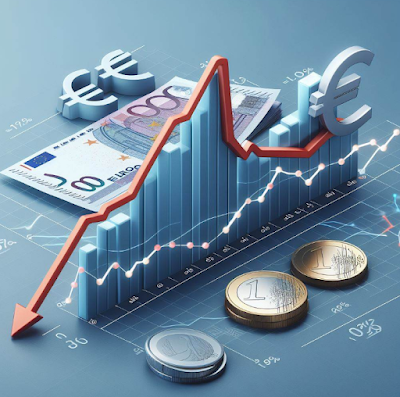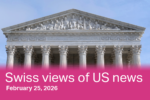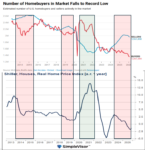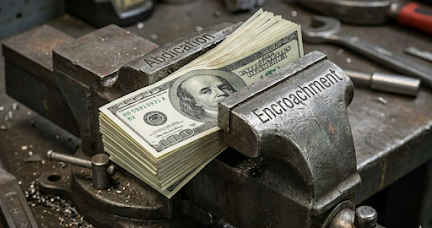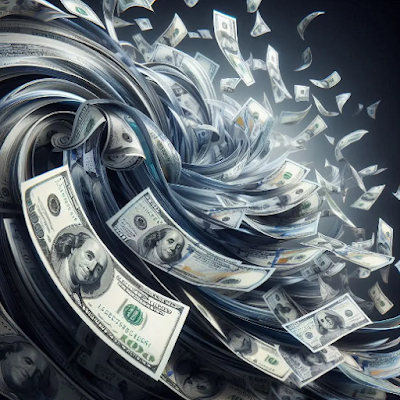Category Archive: 4.) Marc to Market
US CPI, New Security Initiatives with Tokyo and Manila, Bank of Canada Meeting
Overview: The dollar has been confined to narrow ranges ahead of the US CPI report. Given the backup of US rates and the stronger-than-expected jobs growth, the greenback's performance has been unimpressive.
Read More »
Read More »
Dollar Consolidates Softer Ahead of Tomorrow’s CPI
Overview: The dollar is trading with
a softer bias in mostly narrow ranges against the G10 currencies. It did not
rally much ahead of the US jobs data, and it was not able to sustain the upside
momentum afterwards, despite the jump in US yields. Former St. Louis Fed President
Bullard, who still has a strong reputation in the market, told Bloomberg TV
yesterday that three cuts were his base case this year. The Scandis and
Antipodeans are the...
Read More »
Read More »
Will the Market Push the Dollar Above JPY152 as Japanese Prime Minister Heads to the US?
Overview: The jump in US rates after the employment
report failed to ignite a sustained rally in the dollar and this shaken the
market's near-term confidence. The dollar has been mostly confined to narrow
ranges and the low yielding Swiss franc and Japanese yen are softest with the
G10 complex today. The dollar is knocking on JPY152. The Scandis and Antipodeans lead the advancers. The euro has
made little headway despite a much stronger than...
Read More »
Read More »
Week Ahead: Strong US Jobs Data Failed to Sustain Dollar Rally, Can the March CPI do Better?
The March US employment data were stronger than expected and
lend support to the re-acceleration hypothesis and an extension of US
exceptionalism. In Q1 24, nonfarm payrolls rose by an average of 276k. It was
the strongest quarter in a year and compares with an average monthly job gain
of about 251k in 2023. The unemployment rate slipped as the household survey
jumped around 500k after falling in the previous two months. The workweek
increased, and...
Read More »
Read More »
US Employment Data to Set Dollar’s Course
Overview: The
focus is squarely on the US employment report. At the risk of oversimplifying,
given the position adjustment in the past 48 hours, a solid report can see the
greenback recover, while a disappointing report will likely see it deepen the
correction of the rally that began with the February jobs report. The dollar
recovered in the North American afternoon yesterday and many observers
attributed it to the bevy of Fed comments. Yet, the...
Read More »
Read More »
Greenback Losses Extended, but Look for Consolidation in North America
Overview: The softer-than-expected ISM services report caught the market leaning the wrong way. Although interest rates had a muted reaction, the dollar was sold. In fact, the Dollar Index saw its second-biggest loss of the year, falling by about 0.50%. ISM services prices paid increases moderated to their slowest since March 2020. Supplier deliveries improved to their best since 2009, suggesting a supply chain improvement. Still, the Fed funds...
Read More »
Read More »
Rate Adjustment Underpins Greenback
Overview: The adjustment to US interest rates
continues and this helps underpin the US dollar. The 10-year yield rose to
4.40% yesterday, the highest it has been since last November. It is trading
4.34%-4.38% today. The two-year yield is firm though holding below the Q1 high
set last month near 4.75%. This week, for the first time since last October,
the Fed funds futures do not have at least a quarter point cut discounted for
July. As recently as...
Read More »
Read More »
Gold, Oil, and Interest Rates Rise
Overview: The market put more weight on the rise in
the US ISM manufacturing survey than the downward revision to the manufacturing
PMI and the unexpected back-to-back decline in construction spending. US rates
shot up and lifted the greenback. The Dollar Index made a new high for the
year, a little above 105, which had been anticipated by the new lows recorded
by the Bannockburn
World Currency Index (a GDP-weighted basket of the currencies of...
Read More »
Read More »
China PMI is Better than Expected but the Greenback Still Rises above CNY7.23
Overview: The dollar is trading quietly against the G10
currencies as European markets remain on holiday. Narrow ranges have prevailed.
The dollar-bloc currencies are leading with minor gains, perhaps helped on the
margins by better-than-expected Chinese PMI, but the Scandis, which also
typically do well amid a better global growth profile are the laggards. This
may speak to the light liquidity conditions. Japan may have missed a tactical...
Read More »
Read More »
April 2024 Monthly
The macroeconomic and
geopolitical developments have not changed substantially over the past month. The
resilience of the US economy allows the Federal Reserve to put more emphasis on
achieving price stability. While the market favors a June cut (66% vs. 80% at the end of February), it has
not been fully discounted for over a month. The biggest event in March may have been the
well-telegraphed exit from negative interest rate policy and Yield...
Read More »
Read More »
Waller Pushes on Open Door: Push for Patience Lifts the Dollar, Complicating Japanese Efforts
Overview: Comments by Fed Governor Waller, urging
patience on rates and wanting more evidence that price pressures are moderating
has helped the greenback extend its recent gains. The yen is the notable
exception as the fear of intervention has restrained the dollar bulls. Poor
German data, including a sharp 1.9% drop in February retail sales, the fourth
consecutive monthly decline, underscored the euro's negative divergence, and the
single...
Read More »
Read More »
Heightened Threat of Japanese Intervention Pushes Greenback Away from JPY152
Overview: The dollar neared JPY152, setting a new
34-year high. This appeared to spur a senior official meeting in Tokyo,
ostensibly to talk about the response. Previously, we suggested that Friday,
when most markets outside of Asia will be closed, could provide an interesting
opportunity for intervention. The implicit threat was enough to take the dollar
to JPY151.10 in the European morning. Most of the G10 currencies are softer
against the dollar...
Read More »
Read More »
Dollar’s Recent Gains Pared but Firm Undertone Remains Intact
Overview: After surging at the last week, the dollar
consolidated yesterday and is continuing to do so today as slightly lower
levels. The Swiss franc is the only G10 currency unable to gain traction
against the greenback today. Still, the dollar's pullback has barely met the
minimum retracement targets of the jump last Thursday and Friday. The PBOC
lower the dollar's fix slightly, but the proverbial toothpaste is out of the
tube and officials are...
Read More »
Read More »
Greenback Consolidates Last Week’s Surge
Overview: After surging at the end of last week, the
dollar is consolidating today. Stepped up verbal intervention by Japan's
currency chief Kanda and a slightly weaker dollar fix by the PBOC seemed to
take the wind from the dollar sails. Except for the Swiss franc and Swedish
krona, the G10 currencies are showing a slightly firmer tone. Emerging market
currencies are mixed, with central European currencies leading the advancers.
The Taiwanese...
Read More »
Read More »
Week Ahead: Enthusiasm for the Dollar Rekindled
Last
week will be remembered for several things. First, the Bank of Japan lifted its
interest rate target for the first time in 17 years and formally ended its
Yield Curve Control and ceased buying ETFs. The yen sold off and the dollar
approach the 2022 and 2023 cap slightly below JPY152. Japanese officials have
used the language that has signaled heightened risk of intervention in the
past. Second, the Swiss National Bank became the first G10...
Read More »
Read More »
CNY7.20 Gives Way as Strong Greenback Proves Too Much
Overview: The dollar's post-FOMC sell-off has
been completely reversed and the greenback has reached new highs for the week
against most of the G10 currencies. Heightened intervention fears and softer US
yields has helped steady the yen, which near unchanged now, and is the best
performer. The Scandis and Antipodeans are the heaviest, off 0.65%-0.90%. For
the first time since last November, the US dollar has risen above CNY7.20 and
continued to...
Read More »
Read More »
Market Hears a Dovish Fed and Sells the Greenback
Overview: The Federal Reserve triggered a dollar
sell-off yesterday and follow-through selling was seen in Asia before
profit-taking emerged. That created a new dollar selling opportunity in early European
turnover. The FOMC revised up this year's growth forecast, shaved the
unemployment projection, and while maintaining the PCE deflator forecast, and
the median dot remained for three cuts this year. The soft-landing scenario was
underscored and...
Read More »
Read More »
Dollar Extends Gains Against the Yen but Broadly Firmer Ahead of the FOMC
Overview: The US dollar remains bid ahead of the outcome of today's
FOMC meeting. No change in policy is expected, but the forward guidance, partly
delivered in the updated projections, is the focus. In the last iteration
(December), the Fed "dot" was for three rate cuts this year. Japanese
markets were closed for a national holiday today but dollar's gains against the
yen have been extended and the greenback is nearing the peak seen in...
Read More »
Read More »
Greenback Surges after BOJ Hikes and Ends YCC and RBA Delivers a Dovish Hold
The US dollar is surging today against most of the G10 currencies, and although the intraday momentum is stretched ahead of start of the North American session, there may be little incentive to resist before the end of the FOMC meeting tomorrow.
Read More »
Read More »
Heightened Speculation of a BOJ Move Tomorrow did not Stop the Nikkei from Rallying or Yen from Slipping
Overview: The US dollar is trading with a mostly
softer bias against the G10 currencies. The notable exceptions are the Japanese
yen and Swiss franc. Ironically, speculation of a Bank of Japan rate hike
appears to have increased, while there is a risk that the Swiss National Bank
cuts rates this week. The Norwegian krone is the strongest of the major
currencies. The central bank meets later this week but is widely expected to
stand pat. The...
Read More »
Read More »















